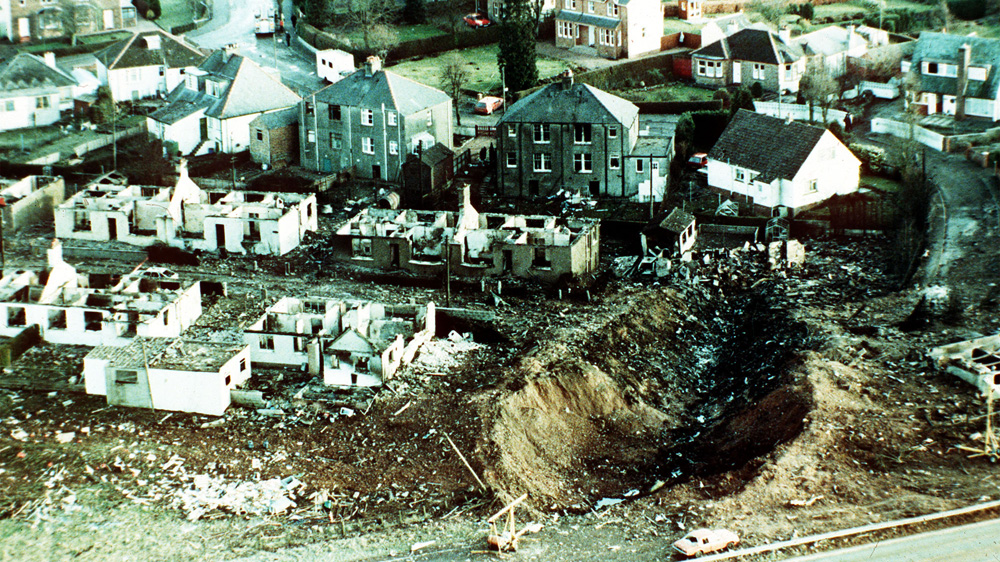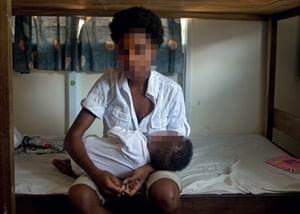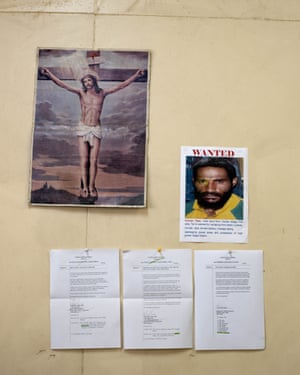Pan AM Flight 103: Was Lockerbie bomber really guilty?
Abdelbaset al-Megrahi was convicted of the deadly bombing, but many believe his conviction was a miscarriage of justice.
- Engagement: 487

Glasgow, Scotland - It was an atrocity that occurred in the skies above Scotland but shook the entire world.
The bombing of Pan Am Flight 103 over Lockerbie on December 21, 1988 remains the deadliest terrorist attack ever perpetrated on British soil. It claimed 259 passengers and crew on board and 11 others on the ground, and thrust a small Scottish border-town into the international spotlight - where it has remained for nearly three decades.
January 31 marked 15 years since Libyan Abdelbaset al-Megrahi was convicted of the bombing by three Scottish judges sitting in a specially convened Scottish court in the Netherlands.
His co-accused Al Amin Khalifa Fimah was acquitted.
To this day, Megrahi, who died in May 2012 protesting his innocence, remains the only person convicted of bringing down the American-bound airliner with a smuggled bomb, which, detonating 38 minutes into its flight from London, flung victims and debris over an 81-mile corridor covering 845 square miles.
Yet, Megrahi's January 31, 2001, conviction, his controversial release by the Scottish government on compassionate grounds due to illness in August 2009, and even his death in Libya from cancer three years later, have all failed to put to rest a murder case that remains one of the most contentious in modern criminal history.
Indeed, as the debate between those who maintain that Megrahi was guilty as charged and those who contend that he was the victim of a miscarriage of justice rages on, for many the case has not limited itself to a battle of evidence alone. It has also seen Scotland and its justice system put through years of unwarranted hardship - which has taken its toll.
 |
| The destruction caused by debris from the explosion on board Pan Am Filght 103 over the village of Lockerbie, which killed 259 people on board, and 11 on the ground. [Martin Cleaver/AP] |
Guilty or innocent?
"I think we should finally put to bed all the conspiracy theories about Lockerbie, which have occupied a great deal of time and space over the last 20 years maybe," said Magnus Linklater, a prominent Scottish political commentator who has become a noted critic of those advocating Megrahi's innocence.
Linklater told Al Jazeera that those who promote the notion of the Libyan's innocence - and the innocence of Libya itself in the Lockerbie bombing - are "misguided".
"As the evidence has gradually built up, I think we can now say that those theories are wrong - and are misplaced," said the former editor of the Edinburgh-based Scotsman newspaper.
The main focus of Linklater's wrath - and that of others who share his views - is Scottish-based Justice for Megrahi (JFM), an organisation that has called into question Megrahi's guilt - and is calling for a public inquiry into the bombing.
It makes no apology for pushing its line that Megrahi's conviction may constitute one of the gravest miscarriages of justice in modern legal history.
Len Murray, a retired Scottish criminal court solicitor and committee member of the group, told Al Jazeera that any notion that the case against Megrahi was "overwhelming", "could not be further from the truth".
"It is worth bearing in mind that while the three [Scottish] judges [who tried the case] were experienced judges, judges in our High Court have never ever had to determine guilt or innocence - that's always left to the jury," he added. "But, when for the first time in modern legal history, it's left to three judges, they get it appallingly wrong."
Many observers share this view. Professor Alan Miller, the outgoing chairman of the Scottish Human Rights Commission, said in an interview with Holyrood magazine on February 19, that the decision to release Megrahi "brought out the best in Scotland and in the Scottish government".
But, for those convinced of Megrahi's guilt, who include Linklater, Britain's and America's political leaders and most - if not all - of the families of the US victims of Pan Am Flight 103, the case is overwhelming.
Megrahi's complicity in the loading of the bomb on to an Air Malta feeder flight at the island's Luqa airport - and the clothes which were said to have been wrapped around the bomb and which were traced to a shop in Malta owned by a man who testified to selling them to the Libyan - was successfully argued by the Crown prosecution during the trial.
Linklater also points to recent research conducted by Ken Dornstein, the brother of one of the Lockerbie victims. In a TV documentary broadcast last year, Dornstein, said Linklater, bolstered the guilty verdict after supposedly uncovering a link between Megrahi and the alleged Libyan bomb-maker, Abu Agila Mas'ud.
 |
| Abdel Baset al-Megrahi (L) is welcomed by Saif al Islam Gaddafi, son of the former Libyan leader, after being released on humanitarian grounds and returned to his homeland in 2009 [AP] |
Flaws in justice?
For JFM's part, a whole raft of concerns, including major doubts over the reliability of the testimony of the Maltese shopkeeper and the starting point of the bomb itself, have caused them to question almost every aspect of the police investigation and trial.
It is this refusal to accept the 15-year-old judgement that has placed the Scottish justice system under unprecedented strain, Linklater stated.
"The Scottish justice system has been subjected to relentless criticism and it has been accused of a miscarriage of justice - and worse a miscarriage of justice in which a succession of lawyers and judges have colluded," said the veteran commentator.
"I think a lot of people have got a lot of apologies to make. I think, yes, they have vilified the judicial system, but I think the judicial system got it right."
Not so, says JFM, which contends that, far from being conspiracy theories, the weight of evidence casting doubt on the Libyan's guilt has been arrived at convincingly.
Retired police officer Iain McKie, who is also a JFM committee member, told Al Jazeera that his two JFM colleagues, signatory John Ashton and committee member Morag Kerr, authors of Megrahi: You Are My Jury and Adequately Explained by Stupidity? - Lockerbie, Luggage and Lies respectively, had backed up their various assertions - which have become central to the group's miscarriage of justice case - with hard evidence.
"Scotland's shame is quite clearly the way the whole affair has been conducted from the beginning - from the investigation, the prosecution, the judicial process and the aftermath. That's Scotland's shame," added McKie.
Supporting Linklater's position is the continuing work of Police Scotland.
It told Al Jazeera that Lockerbie "remains a live investigation" - and that, "along with the Crown Office", it was "committed to working with our colleagues at the FBI, the Department of Justice and the US Attorney's Office in Washington DC to gather any information or evidence that identifies those who acted along with al-Megrahi to commit this despicable act of terrorism".
Yet JFM is itself awaiting the final report of Operation Sandwood - Police Scotland's investigation of nine allegations of criminality levelled by the group at Crown, police and forensic officials who worked on the Lockerbie case. JFM is publicly calling for the inquiry’s final report to be assessed by an independent prosecutor.
As Lockerbie itself remains a live case, JFM awaits the results of Operation Sandwood and continues to campaign against the findings of the 15-year-old verdict, the events of December 21, 1988, will continue to cast a very long shadow.
For the likes of Linklater, that shadow has seen "the Scottish judicial system [dragged] through the mud, and, inevitably, some of it has stuck".
McKie, on the other hand, while expressing his hope that one day "a line can be drawn under Lockerbie", sees himself and JFM, which includes Jim Swire, an English doctor who lost his daughter in the atrocity, as a committee member, as pursuing a noble cause against the odds.
"I would agree that aside from some of the relatives and others deeply affected by the disaster, Lockerbie is a distant tragedy overtaken in a world full of tragedy," he explained.
CITATION:
Soussi, Alasdair. "Pan AM Flight 103: Was Lockerbie Bomber Really Guilty?" - Al Jazeera English. Al Jazeera Media Network, 24 Feb. 2016. Web. 08 Mar. 2016. <http://www.aljazeera.com/indepth/features/2016/02/pan-flight-103-lockerbie-bomber-guilty-160211101436307.html>.
Response:
It has been fifteen years since Libyan Abdelbaset al-Megrahi was convicted of the deadliest terrorist attack that ever occurred on British soil.There are still those that are still fighting for his innocence even though Megrahi died three years ago. The author, Alasdair Soussi, must be biased towards those who believe that Megrahi is innocent or else he would not have brought up an overly sensitive situation if he thought that the Scottish judges had made the right decision. Soussi stated himself that the case is "overwhelming" and many just want for the confirmation of Megrahi's guilt and for closure. But there is evidence to both sides but there is resistance to further investigate as the Scottish judicial system is under attack and being "dragged through mud" for mistakes made fifteen years ago. Soussi may be appealing for further investigation by drawing attention to the situation after so many years, At the end of the article he quotes a relative of one of the victims hoping that one day " a line may be drawn under Lockebie".

